- Home
- BOA in the News
- What will a second-term Murphy administration do to end school segregation? | Opinion
- Pleasantville church tackles segregation at MLK ceremony
- No time for handwashing, absolving ourselves of segregating schools | Opinion
- Pleasantville to Absecon march against school segregation held on Selma anniversary
- Star-Ledger Guest Columnist By Willie Dwayne Francois III
- Pleasantville school board again opposing Absecon's bid to leave district
- Statewide group mobilizes South Jersey leaders to correct school segregation
- A BLACK WOMAN SAID SHE WAS AFRAID OF THE POLICE. A NEARLY ALL-WHITE DISCIPLINARY PANEL SAID WE DON’T BELIEVE YOU.
- Tickets Out of Poverty? The American Prospect magazine
- New York Times - Justice for Blacks and Whites As the Civil Rights Act Turns 50, Creating Cross-Racial Alliances
- The Diverse Suburbs Movement Has Never Been More Relevant
- Behind tension over Texas pool party, a seismic shift in American suburbs - CSMonitor
- Communities face challenge of sustaining middle class reality
- Building One Ohio summit brings together over 150 local leaders
- 20 Years Later, Law Was Worth The Wait
- Community leaders want collaboration
- Once-aspirational Philadelphia suburbs struggle with poverty
- A tale of two towns reveals tipping point for America's suburbs
- BOA attacked in Breitbart News
- The Bad Economics of Balkanized Suburbs
- About Us
- Contact Us
- Donate
- Leadership Training
- Annual Year-End Celebration and Awards Ceremony 2023
- John Froonjian Honored at Year-End Celebration, Dec 14, 2023
- Lawrence Lustberg Honored at Year-End Celebration, Dec 14, 2023
- Lloyd Henderson Honored at Year-End Celebration, Dec 14, 2023
- Rev. Dr. Albert Morgan Honored at Year-End Celebration and Awards Ceremony Dec 14, 2023
- Tennille McCoy Honored at Year-End Celebration and Awards Ceremony Dec 14, 2023
- Tribute to Gill, Giblin, Jasey at Year-End Celebration, Dec 14, 2023
- Leadership Training for Inclusive Communities, June 27 - 30, 2024, Stockton University, Galloway, New Jersey.
- School Segregation in NJ
- Summit for Civil Rights 2023
- Take Action
Building One America Board of Directors
Sheryll Cashin - Vice President

Sheryll Cashin, Professor of Law at Georgetown, writes about race relations and inequality in America and is a passionate advocate and sought after speaker. She teaches Constitutional Law and Race and American Law, among other subjects. Currently she is working on a new book about the future of American race relations.
Her book, The Agitator's Daughter: A Memoir of Four Generations of One Extraordinary African-American Family (Public Affairs, 2008) traces the arc of American race relations through generations of her family. Her book, The Failures of Integration (Public Affairs, 2004) was an Editors' Choice in the New York Times Book Review. Both of Cashin's books were nominated for the Hurston/Wright Legacy Award for non-fiction (2005 and 2009).
Cashin is an active member of the Poverty and Race Research Action Council (PRRAC) and Building ONE America, an emerging national network of state and regional coalitions promoting sustainable growth and social inclusion. She has published widely in academic journals and print media, including in the L.A. Times, Washington Post, and Education Week. She has appeared on NPR All Things Considered, NPR Talk of the Nation, The Diane Rehm Show, The Tavis Smiley Show, The Newshour With Jim Leher, CNN, BET, ABC News, and numerous local programs.
Professor Cashin worked in the Clinton White House as an advisor on urban and economic policy, particularly concerning community development in inner-city neighborhoods. She was law clerk to U.S. Supreme Court Justice Thurgood Marshall and Judge Abner Mikva of the U.S. Court of Appeals for the District of Columbia Circuit. She graduated summa cum laude from Vanderbilt University in 1984 with a bachelor's degree in electrical engineering. As a Marshall Scholar, she went on to receive a masters in English Law, with honors, from Oxford University in 1986 and a J.D., with honors, from Harvard Law School, in 1989, where she was a member of the Harvard Law Review.
Cashin was born and raised in Huntsville, Alabama, where her parents were political activists. She is married to Marque Chambliss and the mother of twin boys, Logan and Langston.
Algernon Austin
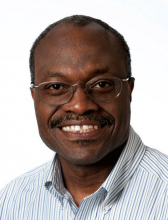
Algernon Austin is a consultant working on race, economics, and public opinion. He was the first Director of the Program on Race, Ethnicity and the Economy at the Economic Policy Institute in Washington, DC. Prior to joining the Economic Policy Institute, Austin was a Senior Fellow at the Dēmos think tank and assistant director of research at the Foundation Center. From 2001 to 2005, he served on the faculty of Wesleyan University.
Michael B. de Leeuw
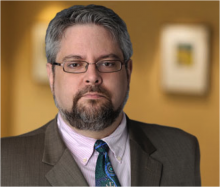
Michael B. de Leeuw is a litigation partner at the New York offices of the firm of Cozen O’Connor.
Michael de Leeuw focuses his practice on complex litigation, including litigation involving securities, antitrust law, the First Amendment, defamation, mergers and acquisitions, and bankruptcy. Michael also advises clients on defamation and advertising issues.
Recent matters Michael has handled include representing Staples in litigation with the FTC relating to Staples’ proposed merger with Office Depot; defending a national organization in a high-profile defamation case in federal court in Mississippi; defending a major online poker company and its owners in a series of consumer class actions; defending directors in a major securities litigation in the Southern District of New York; defending the former CFO of a pharmaceutical company in a civil action brought by the SEC; representing a national government strategies firm in a AAA arbitration; representing hedge funds in several major bankruptcies. He has also been counsel of record in multiple U.S. Supreme Court cases, representing parties and amici curiae.
Michael is active in bar and civic organizations. He is on the board of the Lawyers' Committee for Civil Rights Under Law; he recently acted as co-chair of the ABA Antitrust Litigation Committee; and he is also an elected member of the Board of Education in Glen Ridge, N.J.
Michael earned his law degree from Rutgers University School of Law, graduating cum laude and as a member of the order of the coif. He was editor-in-chief of the Rutgers Computer & Technology Law Journal. He received his bachelor's degree from Montclair State University, majoring in philosophy.
Michael Kruglik - President

Mike Kruglik is the first Executive Director of Building One America.
Mr. Kruglik is a graduate of Princeton University (1964), was adjunct Professor of History at Northwestern and Roosevelt Universities in the early 1970’s. He has been developing grass-roots citizens’ power organizations since 1973 with the Industrial Areas Foundation, the Gamaliel Foundation and Building One America.
From 1973-1976, he was lead organizer on the Southside of Chicago for the Citizen Action Program, where he helped build a middle-class, multi-racial organization in Chicago, and lead the successful fight against Mayor Daley’s Cross-town Expressway, preserving neighborhoods on the South and Southwest and the North and Northwest sides of the city. In 1979, Mr. Kruglik was Executive Director of the Citizens Organized for Public Service (COPS) in San Antonio, TX. where he led a campaign that established a network of community health centers on the South and West sides of San Antonio.
From 1984 to 1998, he was co-director of the Calumet Community Religious Conference, the community organization that recruited and hired Barack Obama as a community organizer. Mr. Kruglik’s role as Barack Obama’s mentor has been chronicled in a number of works of history and periodicals. From 1986-1998, he developed/directed the South Suburban Action Conference (SSAC) in South Cook County, Illinois. SSAC is a large congregation-based citizen organization, which created a community development arm, New Cities CDC, which produced over 2.000 housing units, and spawned two national housing programs. From 2001 to 2004, he was Executive Director of Metropolitan Congregations United (MCU) in St. Louis.
In 1986 Mr. Kruglik, was co-founder of the Gamaliel Foundation, and from 1999-2009 served as its Director of Metropolitan Equity.
Lawrence Levy
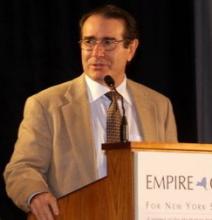
Lawrence Levy is the Executive Dean at National Center for Suburban Studies at Hofstra University.
During his 35 years as a reporter, editorial writer, columnist and PBS talk show host, Lawrence Levy won many of journalism’s top awards, including Pulitzer Finalist, for in-depth works on suburban politics, education, taxation, housing and other key issues. As a journalist, he was known for his blending of national trends and local perspectives and has covered six presidential campaigns. In his leadership role at the NCSS, he has worked with Academic Director Christopher Niedt to give it a truly national profile. He works especially close with Hofstra’s strong academic community to shape an innovative agenda for suburban study, including a new Sustainability Studies degree, forge alliances with other institutions, not-for-profit groups and government agencies and promote the study of the suburbs nationwide.
Levy is a member of a Brookings Institution advisory panel and was a keynote speaker at Brookings 2008 Metro Policy Summit in Washington, DC. Levy also led a collaboration between Hofstra and Boston College to create a first-in-the nation suburban ecology initiative, and another alliance between Hofstra and Cornell to sponsor the Local Government Leadership Institute. Before joining Hofstra, he was Senior Editorial Writer and Chief Political Columnist for Newsday, and remains involved in the world of journalism and politics. Levy has been a guest contributor to CNN.com, the New York Times.com, covering the 2008 presidential campaign from a suburban perspective. He also writes a regular column on politics for the Albany Times Union, and appears regularly on local and national television.
John A. Powell
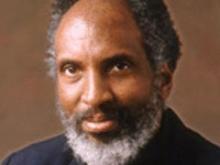
John Powell is Director of the Haas Diversity Research Center at the University of California, Berkeley.
Professor powell is a nationally recognized authority in the areas of civil rights, civil liberties and issues relating to race, poverty, and law. He teaches civil rights law, property law and jurisprudence and was recently appointed the Earl R. Larson Chair of Civil Rights and Civil Liberties Law at the University of Minnesota Law School. He is founder and former Executive Director of the Institute on Race & Poverty, at the University of Minnesota Law School. The Institute was created in 1993 to focus on dynamics created by the intersections of race and poverty. Its focus has always been on real issues that affect real people, including metropolitan equity issues, such as concentrated poverty, education, economic viability and urban sprawl.
Professor powell received his B.A. Degree from Stanford University and his J.D. from the University of California at Berkeley (Boalt Hall). After law school, he became an attorney with the Seattle Public Defender's Office. In 1977, he received an International Human Rights Fellowship from the University of Minnesota to work in Southern Africa, where he served as a consultant to the government of Mozambique. Professor powell later served as a staff attorney for Evergreen Legal Service and as director for Legal Services of Greater Miami.
From 1987 to 1993, he served as national legal director of the American Civil Liberties Union, where he was instrumental in developing educational adequacy theory. Professor powell has taught at Columbia University School of Law, Harvard Law School, University of Miami School of Law, American University and the University of San Francisco School of Law. He joined the University of Minnesota Law School faculty in 1993.
Professor powell is the author of many articles and books dealing with issues of race and poverty and how to make our society more equitable. He is a member of the National Legal Aid and Defender, the National Housing Law Center Association, and the National Bar Association. He is also a member of the American Bar Association's Commission on Homelessness and Poverty and serves on the Board of Directors of the Poverty & Race Research Action Council (PRRAC), and the Minnesota Supreme Court's Implementation Committee on Multicultural Diversity & Racial Fairness. He was the chair of the City of Minneapolis Affordable Housing Task Force.
He was recently featured in an article published in the fall issue of Colorlines Magazine entitled "What we need to do about the 'burbs." The article is on the magazine Web site at www.colorlines.com. Professor powell authored an article entitled "Achieving Racial Justice: What's Sprawl Got to Do with it?" in the September issue of Poverty & Race published by PRRAC. Many of his articles can be found in the News Articles section of the IRP Web site.
Ann Pratt - Treasurer
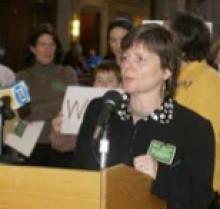
Ann Pratt is the Director of Organizing Connecticut Citizen Action Group.
Ann brings thirty years of community organizing experience to Progressive States Network, including ten years of building and directing a diverse range of community organizations including neighborhood organizations, large social service agency, labor unions, regional faith-based organizing initiatives and statewide parent and child advocacy organization. Most recently, Ann directed the Connecticut Early Childhood Alliance, a statewide advocacy organization committed to improving outcomes for young children. She has worked extensively on advancing progressive policies in Connecticut, including the nationally recognized “Sustinet” health care legislation, and recently spearheaded an initiative calling for the creation of a Department of Early Education that would serve children from birth to five years of age.
Ann’s extensive history of organizing includes working with the Greater Hartford Interfaith Coalition for Equity and Justice, a regional faith-based organization; serving as the Executive Director of Hartford Areas Rally Together (HART), a 25 year-old community organization working to improve the quality of life for Hartford residents; spearheading a faith-based initiative supporting the organizing activities of the CT State Council, SEIU; and serving as a national trainer for Building One America, an organization committed to addressing social inclusion, environmental sustainability and economic growth.
Ann graduated from Oberlin College in 1991 with a BA in Political Science. She is married and is the proud mother of a 19-year-old son.
David Rusk
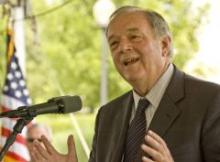
David Rusk is the immediate past president and the founding president of the Building One America.
The Congressional Quarterly has called David Rusk’s Cities without Suburbs “the Bible of the regionalism movement.” “A must read for all practicing local government officials, elected or appointed,” said the Government Finance Review of Rusk’s Inside Game/Outside Game.
Rusk combines strong analytical skills with practical political experience. He is a former federal Labor Department official, New Mexico legislator, and mayor of Albuquerque, the USA’s 32nd largest city.
Now a consultant on urban policy, Rusk has worked in over 120 US communities. Abroad, Rusk has lectured on urban problems in Canada, England, Germany, South Africa, and The Netherlands.
He is president of the Metropolitan Area Research Corporation and national strategic partner of the Building One America movement. As a visiting scholar at the Woodrow Wilson International Center for Scholars in Washington DC this summer, he prepared a fourth edition of Cities without Suburbs (winter 2012-13)
Since 1991, he and his wife, the former Delcia Bence of Buenos Aires, Argentina, have lived in Washington, DC.
Philip Tegeler
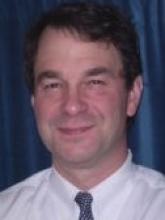
Philip Tegeler is the Executive Director of Poverty & Race Research Action Council (PRRAC), a civil rights policy organization based in Washington, DC. PRRAC’s mission is to promote research-based advocacy on structural inequality issues, with a specific focus on the causes and consequences of housing and school segregation.
Mr. Tegeler has written extensively on federal housing policy, including “The Future of Race Conscious Goals in National Housing Policy,” in Public Housing Transformation: Confronting the Legacy of Segregation (The Urban Institute Press, 2009); “Connecting Families to Opportunity: The Next Generation of Housing Mobility Policy,” in All Things Being Equal: Instigating Opportunity in an Inequitable Time (New Press 2007); and “The Persistence of Segregation in Government Housing Programs,” in Xavier de Souza Briggs, ed., The Geography of Opportunity: Race and Housing Choice in Metropolitan America (Brookings Institution Press 2005).
Before coming to PRRAC, Phil worked as an attorney with the Connecticut ACLU for 16 years, serving as Legal Director from 1997-2003. At the ACLU, he helped to prosecute housing and school desegregation cases, and a wide range of other institutional reform litigation. Phil has taught on the clinical faculty at the University of Connecticut Law School in Hartford, and was Legal Projects Director at the Metropolitan Action Institute in New York, a public interest urban planning organization. He is a graduate of the Columbia Law School.
Myron Orfield
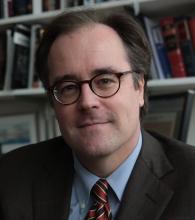
Professor Myron Orfield is the Executive Director of the Institute on Race & Poverty, a non-resident senior fellow at the Brookings Institution in Washington, D.C., and an affiliate faculty member at the Hubert H. Humphrey Institute of Public Affairs. He teaches and writes in the fields of civil rights, state and local government, state and local finance, land use, questions of regional governance, and the legislative process. For 2005-06, Professor Orfield served as the Fesler-Lampert Chair in Urban and Regional Affairs.
Professor Orfield graduated, summa cum laude, from the University of Minnesota, was a graduate student at Princeton University, and has a J.D. from the University of Chicago, where he was a member of the University of Chicago Law Review. Following law school, he clerked for the United States Court of Appeals for the 8th Circuit and then returned to the University of Chicago Law School as a Research Associate and Bradley Fellow at the Center for Studies in Criminal Justice. After working as an associate at Faegre & Benson in Minneapolis, he served as a Special Assistant Attorney General of Minnesota in the Solicitor General's Division.
In 1990, Professor Orfield was elected to the Minnesota House of Representatives, where he served five terms, and to the Minnesota Senate in 2000, where he served one term. There he was the architect of a series of important changes in land use, fair housing, and school and local government aid programs. His first book, Metropolitics: A Regional Agenda for Community and Stability (Brookings 1997), a study of local government structure and demographics, relates to these efforts. For over a decade, Professor Orfield has been president of a nationally respected regional research organization undertaking studies involving the legal, demographic and land use profiles of various American metropolitan areas. His second book, American Metropolitics: The New Suburban Reality (Brookings 2002), is a compilation of his work involving the nation's 25 largest regions. His most recent book, Region: Planning the Future of the Twin Cities (U of M Press, 2010), co-authored with Thomas Luce, director of research at the Institute on Race and Poverty, examines the successes and failures of the Twin Cities Metropolitan Council’s regional planning and policy work and includes recommendations for responsible, environmentally sound urban and suburban planning.
R. Lenton Buffalo, Jr.
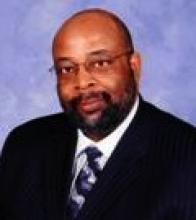
R. Lenton Buffalo, Jr. is the past president of Building One New Jersey, a grassroots, faith-based organization dedicated to promoting regional equity, stability, and growth in New Jersey and contiguous regions. Pastor Buffalo has served the Union Baptist Church of Elizabeth, New Jersey for more than 21 years. He is a graduate of Morehouse College, the University of Pittsburgh and Pittsburgh Theological Seminary.
Robert Kleidman - Recording Secretary
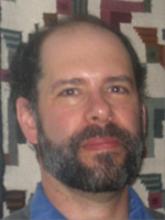
Robert Kleidman is Associate Professor of Sociology at Cleveland State University. His research and service center on ‘public sociology,’ developing intellectual and institutional relationships between academia and organizing. His major areas of interest are the study of social movements and community organizing, and secondary areas including urban sociology. His initial interest in public sociology came as a graduate student at the University of Wisconsin, Madison, where he became a leader in the Nuclear Weapons Freeze Campaign, serving on local, state, and national boards of directors. He wrote his Ph.D, dissertation on the Freeze and earlier peace campaigns, identifying common themes important to organizers. Building on this work, he authored Organizing for Peace: Neutrality, the Test Ban, and the Freeze. (1993, Syracuse University Press)
Since joining the faculty at Cleveland State University, he has moved his focus to community organizing, serving as a core team leader and board member of a regional community organizing group. Since 2009, he has been working closely with organizers for Building ONE America, an emerging national network of statewide and metropolitan organizations, to create a powerful group of local elected officials and other community leaders in established suburbs in Ohio. He has published articles about community organizing and public sociology. Before receiving his Ph.D. from Wisconsin, Dr. Kleidman received an undergraduate degree from Cornell University and a Master’s degree from the University of California Berkeley.
Paul Scully - Executive Director
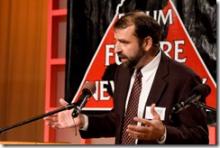
Paul Scully has over 20 years experience organizing with community organizations, lab or unions, and religious institutions. He spent four years with the International Ladies Garment Workers Union (ILGWU) in New Jersey, Ohio and Pennsylvania and two years organizing in Washington, DC with the Service Employees International Union (SEIU). He spent ten years as the founding director a successful regional organization in Northwest Indiana affiliated with the Gamaliel Foundation of Chicago.
Mr. Scully was a member of the senior staff of the Gamaliel Foundation from 1996 through 2001 where he dir ected organizing activities in Indiana and later throughout the northeast. As Gamaliel’s East Coast Director, Mr. Scully helped establish successful regional organizations in Northern New Jersey, Central Connecticut, Long Island, and Baltimore. He also helped establish an organization in South Africa.
Since its founding in 2003, Mr. Scully served as Executive Director of the New Jersey Regional Coalition, (now Building One New Jersey) , a statewide organization celebrated for winning major victories around e ducation funding and fair housing reform. Before becoming the Executive Director, Scully served as Building One America’s first Strategic Director overseeing all of its organizing and field operations.


